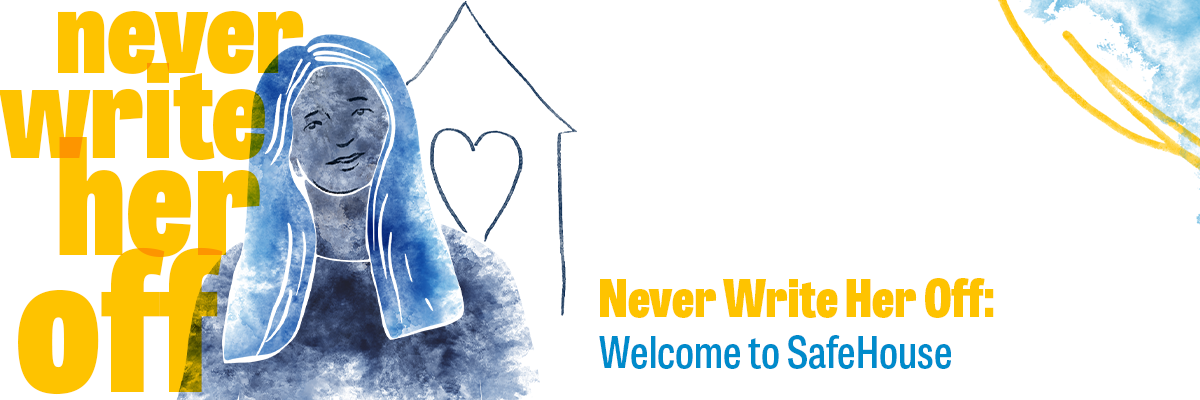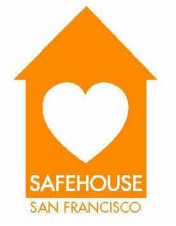Never Write Her Off: Welcome to SafeHouse

Through our Community Focus Series, All In is centering the voices of people with lived homeless experience and sharing the knowledge of those working to provide the solutions—homes and services—we need to make homelessness history in San Francisco.
My journey to becoming the Executive Director of SafeHouse actually started when I was a SafeHouse client. Originally from Mississippi, I moved to the Bay Area in 2000 to be with my partner who had gotten a job working on the Bay Bridge. That relationship was abusive and exploitative. This led to a series of relationships that were abusive and exploitative. There is a big misconception that sex trafficking does not happen in San Francisco. But, it does. It is a national, state, and local issue. And, it can, and all too often does, lead to homelessness. I was homeless for seven years.
But, I survived—with the support of SafeHouse. When I needed a hand, SafeHouse was there. In fact, I credit SafeHouse with helping me go from being a victim, to a survivor, and now an advocate for women’s economic empowerment and breaking the cycle of exploitation and homelessness.
I completed my first year of college as a SafeHouse client. Since then, I have completed my Master’s degree in social work, and worked for SafeHouse for over ten years, serving in various roles including Residential Counselor, Operations Manager, Outreach and Training Manager, and since 2019, Executive Director.
I decided to become the Executive Director of SafeHouse because I want to give back to the community. As a survivor of sexual violence, I know first-hand how sexual violence impacts our clients and their families. I know how important it is to offer programs and services that are specific to women and that allow them to connect with other women facing similar circumstances.
That is what SafeHouse provides: A literal safe space for women to come together to heal from the trauma of sexual violence and exploitation. We strive to be a one-stop shop by offering a full array of wrap-around supportive services, including mental health, substance use, education, and case management. Moreover, in our work, we center the needs of some of the most marginalized women in our community. We focus on serving non-English speaking, immigrant, BIPOC, and trans women. 40% of our clients are Black and 32% are trans or gender non-conforming folks.
We see first hand the huge disparities that exist between access to care for our clients and for others who experience homelessness and sexual violence. We pride ourselves in meeting clients where they are, which requires a very individualized approach, treating everyone based on their particular experiences. We also offer a range of housing from transitional housing to permanent rehousing.
And while we already offer a broad range of services, I am constantly learning from my clients about what approaches work best. I am also constantly inspired by my clients. Every day, they take steps, big and small, to heal and grow. “Success” looks different for each client. It could be finally trusting a case manager enough to explore treatment or getting a new job or graduating. We support all of it.
Providing that support is not without challenges. We are seeing more clients with severe mental illness. We also have long wait lists for our services. For example, we have fifty people hoping to find a place in our transitional housing program, which offers just ten beds. One of our clients left her program early so that she could make room for her sister to get services, and another left to make room for her mother. No one should feel compelled to make that choice.
We are trying to secure the funding to purchase a residential building just for women. Most permanent supportive housing in San Francisco is in single room occupancy hotels which overwhelmingly house men. We know that our clients don’t feel safe in that setting.
Women experience homelessness differently and thus the strategies to address their homelessness need to be different. We need more people to understand these differences and we need the public to advocate for more resources for women experiencing homelessness and sexual violence. If we don’t, we will perpetuate the intergenerational cycle of violence.
At SafeHouse, we see potential in women whom others may have written off. I know how important that is. It is how I ended up as the Executive Director.
 TONI EBY
TONI EBY
As a survivor, Toni has a strong commitment to advocating for and serving survivors of sexual exploitation and violence. In her previous role as Outreach & Training Manager, she gained valuable expertise in program development, outreach, and fundraising. Toni has been with the organization for the past decade, and has held a variety of positions at SafeHouse, including Outreach & Training Manager, Operations Manager, and Residential Counselor. Additionally, she has served as a Domestic Violence Counselor for St. Vincent De Paul’s Riley Center, where she worked to counsel, advocate for, and empower survivors of violence. She holds a Master’s in Social Work and a Bachelor’s in Women and Gender Studies from San Francisco State University. In addition, she is a graduate of San Francisco SafeHouse and uses her personal experience as motivation and inspiration to continue serving survivors of sexual exploitation.
“As someone who is deeply passionate about women’s empowerment and breaking the cycle of exploitation and homelessness, I am excited about the opportunity to lead this wonderful organization–an organization that helped change my life.” – Toni Eby
SafeHOUSE
Mission: To empower and support women who are experiencing housing instability and sexual exploitation or trafficking, by creating survivor-centered spaces, services, advocacy, and community education.
SafeHouse provides gender-specific responses to chronic homelessness for this overlooked and underserved population. They offer supportive transitional housing and a full array of support services that enable residents to reclaim choice and power over their lives and move toward the goal of living a happy, health and independent life. In line with their transitional housing, in September 2019, they officially opened their new program, the Hope Center drop-in services to provide the same services for women who are in the waitlist for our transitional housing and women still living on the street.

